Psychoanalysis on Conflict of the Main Character Joe Goldberg in TV Series You Season 3
on
ISSN: 2528-4940
Vol. 02, No.01: Oktober 2022, pp-136-144.
STILISTIKA
Journal of Indonesian Language and Literature
PSYCHOANALYSIS ON CONFLICT OF THE MAIN CHARACTER JOE GOLDBERG IN TV SERIES YOU SEASON 3
Ni Luh Putu Widi Saraswati1*, Ketut Artawa2, Ni Made Ayu Widiastuti3 Udayana University
*Surel: niluhputuwidisaras11@gmail.com doi: https://doi.org/10.24843/STIL.2022.v02.i01.p12 Article submitted: 21 Juni 2022; Accepted: 24 Juli 2022
PSYCHOANALYSIS ON CONFLICT OF THE MAIN CHARACTER JOE GOLDBERG IN TV SERIES YOU SEASON 3
Abstract. The purpose of this research is to examine the character of Joe Goldberg in the television series You will learn about the challenges Joe Goldberg confronts and how his character resolves them from a psychoanalytic perspective. This study employs a qualitative approach, as qualitative research focuses on qualitative phenomena. The purpose of this research is to ascertain how individuals feel or think about a certain issue or institution. Additionally, this study employs two theories: the first is from Sigmund Freud and is referred to be the model of the mind; the second is from Kenney and is referred to as the forms of conflict. Following that, this study discovered that conflict between a single man and conflict between men happened mostly in Joe Goldberg's character. Meanwhile, when Joe Goldberg is attempting to solve an issue, his id, ego, and superego all play a significant part.
Keywords: conflict, psychoanalysis, kenney, sigmund freud.
INTRODUCTION
As with humans and their shadows, conflicts and issues are inextricably linked. We can also discover conflicts and problems in everyday life, but they are also represented in the television dramas we typically watch, where they are presented in a more complex and dramatic manner and accompanied by thrilling problem resolution by the characters. When confronted with a dilemma in real life, we will exercise caution in resolving the issue. Nonetheless, we routinely and unconsciously solve problems without thinking, which leads formerly simple problems to become more complicated. Typically, this occurs when we are purely selfish, emphasizing our own desires without regard for others. This does not mean we must be second, but it is critical to strike a balance when confronted with a situation. Here, a psychological perspective can go deeper into human behavior and examine how the id, ego, and superego react to a crisis.
As previously said, literary works that combine the author's imagination with real-world occurrences portray human behavior and relationships. Psychoanalysis is
one branch of psychology that is capable of character analysis. According to Hossain (2017), psychoanalysis is not just a part of medicine or psychology; it also aids in the comprehension of philosophy, culture, religion, and, above all, literature.
Psychoanalysis is frequently used to examine writers' subconscious minds, which can be evident in their work. However, its application to character analysis is still uncommon. As Wright (2003) points out, psychoanalysis of literary characters is not comparable to psychoanalysis of writers. It continues to be a booming industry. Freud pioneered a dynamic branch of psychology called 'psychoanalysis,' which he used to diagnose and cure neuroses. It quickly grew, however, to embrace a diverse variety of events and actions throughout civilization's history, including warfare, mythology, religion, and other literature and arts (Abrams & Harpham, 2011, p. 320). Sigmund Freud introduced a second topographical model, in which he began to view the mind as being composed of three different agents: the id, the ego, and the superego (Wright, 2003, p. 11). The psychic structure must be balanced in order to preserve the psychic self. According to idntimes.com, we must be able to balance the three psychological components of ourselves in order to be mentally aware. If any of them were more visible, it would pose a threat to humankind.
According to Kaplan and Kloss (1973), fictional characters can only be interpreted as representations of life if we see them as genuine. Additionally, this assumption enables us to generate unconscious motivation using the same process as traditional critics do (Wright, 2003, p. 46). Additionally, we can learn from fictional characters how critical it is to keep psychological balance when attempting to solve an issue and how critical it is to maintain psychological balance in order to appropriately resolve the challenges we confront.
This research then narrows the field to the third season of the television series You, starring Penn Badgley as Joe Goldberg. Joe was chosen as the protagonist because he appears to struggle with balancing his personality, which has an effect on the choices he makes when addressing challenges. This study analyzes problem-solving in terms of the psychological structure of the main character's personality and the type of conflict using Sigmund Freud's (1923) and Kenney's (1966) theories. This study will examine how Joe Goldberg resolves conflicts using a psychoanalytic approach and Kenney's idea of conflict kinds.
RESULT AND DISCUSSION
From the results of the analysis of the types of conflict faced by the main character Joe Goldberg and the problem solving carried out by Joe Goldberg in terms
of his psychological structure of personality using Kenney (1966) and Sigmund Freud (1923). This study found the following results:
Conflict within a single man happen when Joe develops feelings for his neighbor, Natalie, conflict ensues. Joe's stalking habit cannot be broken despite his marriage. Thus far, it seems as if Joe has been surreptitiously following Natalie in order to learn about her everyday routine and to learn more about her. Joe even discovered her husband's whereabouts, since he was seldom seen at home. Joe received a call one day that turned out to be from Natalie. Natalie asks Joe to her place for a glass of wine. Joe, of course, did not deny Natalie's invitation. Joe then visited Natalie's place, where they drank wine and discussed their neighborhood and marriage.
Natalie then urged Joe to have a look around her reading room as they started to get carried away. Joe steals Natalie's personal items in the den, and as he looks about, Joe realizes he married the wrong person, and wonders what if Natalie is the one for him. There is also an internal struggle, with Joe questioning if Natalie is the proper person to be his wife, and Joe believing he made a mistake marrying Love, whom he believes is the wrong person.
Natalie then taunted Joe; Joe, who had been an admirer of Natalie's from the beginning, kissed her instantly. However, as Natalie begins to behave erratically, Joe remembers that he is a parent and spouse and that what he did was wrong. He is torn between having an affair and choosing his family. Joe, on the other hand, chooses his family and abandons Natalie. Joe also made a pledge to himself that he would make the most of this marriage (not having an affair). Joe then resolves to distance himself from Natalie in order to concentrate on his family
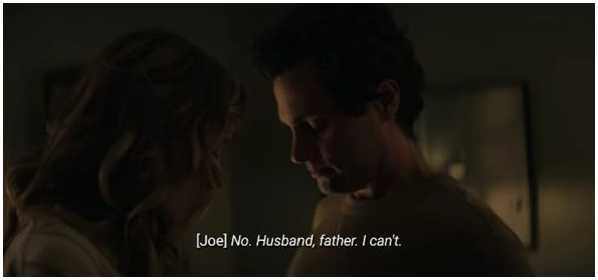
Picture 1 When Joe realize that he's now a father and husband
Additionally, the conflict between a single man and Joe emerges when Love murders Natalie after learning about Joe and Natalie's relationship. Joe cleans up his wife's mess the day after Love murders Natalie. Three days after Natalie's death, the residents of Madre Linda started distributing brochures on poles in search of Natalie.
Natalie's disappearance was also covered extensively on national television. The investigator also visited Joe's residence to interview the husband and wife, who duped the detective beautifully and efficiently.
While Joe was working at the library, he received a call from an unknown number; it turned out to be the detective who had visited his home earlier. The investigator returns to the library and requests an explanation from Joe, who have seen talking with Natalie in the grocery parking lot. Joe then recounts the truth about what occurred in the parking lot, and as the two investigators go, Joe wonders how the two detectives discovered his connection with Natalie since only Love was aware of it. Joe then suspects Matthew is knows of this due to the surveillance cameras put around Natalie's residence. Joe also felt Natalie was lying the whole time. Perhaps Natalie did not turn off the CCTV cameras at Joe and Natalie's residence while they were drinking. Joe then worries that Matthew is planning to assassinate Natalie. This results in an internal dilemma for Joe.
Joe also intends to malign Matthew by bringing Natalie's blood-stained scarf to Matthew's residence. When Joe attempts to get into Matthew's home, he has hallucinations and faints, which Matthew assists and transports to his residence. Joe then faces another internal dilemma. He wonders whether Matthew knew Joe had come to hide the scarf, and when questioned about what he was doing in the yard by Matter, Joe explains that he is ill and suffering from a dream fever that keeps him going around in Matthew's home.
When Matthew starts asking questions about Natalie, Joe believes Matthew is aware of what happened to Natalie and is only acting stupid in front of Joe to set Joe up. However, following closer examination, it seemed as if Matthew was utterly ignorant and hoped that Joe could have some knowledge that might assist him in locating his wife. Joe then considered if Matthew was a decent guy. Additionally, Joe's beliefs about Matthew are incorrect because Matthew assists Joe, who collapses behind his home, by administering fever-reducing medication.
Joe then informed Matthew about his son's illness, and Joe said that God may punish him via his son's illness. According to Matthew, it is not punishment, rather God reflects their misdeeds on them, which is evidently dazzling. Joe was once again confronted with an internal struggle upon hearing Matthew's statements. Joe want to assist Matthew in resolving Natalie's disappearance. However, it would be preferable if Matthew maintained his silence and allowed the public to blame him of murdering Natalie (because in the household, if one of the spouses suddenly disappeared, it was
the other partner). However, Joe ultimately chose not to defame Matthew because he believed he would be a horrible and awful dad to Henry if he did it.
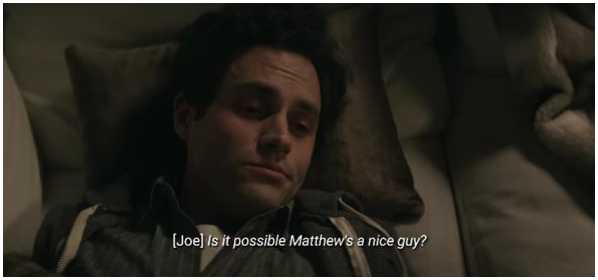
Picture 2 When Joe wondering is Matthew a nice guy?
Joe had several conflicts with Love's wife during the battle between the men. The fight occurred even before they chose to marry. Their love tale began with a chance encounter in a supermarket, which went swimmingly. They are similar to a pair in Love. However, all of those changes as Joe discovers Love's true nature, a character who is not afraid to murder innocent people for the people he loves. Additionally, when Joe discovers who Love is, he becomes enraged and wishes to murder him. On the other hand, Joe does not do so when he discovers that Love is pregnant with their kid.
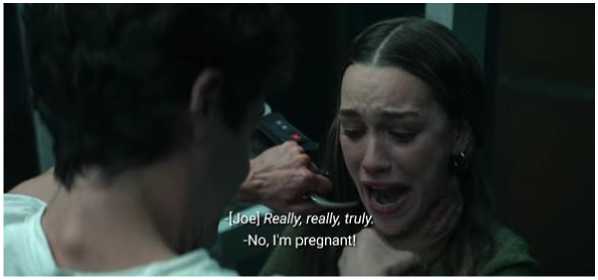
Picture 3 When Joe tried to kill Love
Joe and Love's fight does not end there. Joe and Love's conflict intensifies when Love discovers that Joe is having an affair with his neighbor, Natalie. Joe has a tendency of chasing women he admires, and he will go to any length to get near her. Joe appears to follow a pattern when he develops feelings for women: pursuing her, approaching her with affirming words and acts of kindness, and stealing her personal stuff. When Love discovers that Joe is having an affair with his neighbor, she becomes enraged with him, despite the fact that Joe denies having an affair with his neighbor. Joe then informed him of what had occurred; it was verified that they had been drinking, and when Natalie began acting erratically, Joe instantly abandoned her.
However, Joe and Love's fight does not end there. When Joe realizes that Love murdered Natalie, he becomes enraged with Love; whether Joe likes it or not, Joe is forced to clean up the mess that Love created. However, even though they believed the issue with Natalie's condition had been rectified, Joe and Love are forced to rebury Natalie due to a previous error. It comes out that Natalie's ring has a GPS. Joe appeared to understand what he needed to do and where he needed to rebury Natalie's remains. Meanwhile, Love is taken aback by Joe's ability to make so many preparations and know just where to bury Natalie. Joe, on the other hand, had it all recorded in his head. Joe has several plans constructed in his brain as a result of marrying a killer; hence, he necessarily must have a strategy for survival as a result of marrying a monster (Love). Here, Love believes Joe is implying that Love is a psychopath, despite the fact that Joe is doing the same thing as Love.
The two continue to argue when Love recalls Joe's desire to murder her with a hook, but Joe does not kill her when she reveals she is pregnant. And Joe continues to pretend as if nothing occurred when they married, despite the fact that he desired to murder Love. And as a result, Love believes Joe is constantly behaving innocent, yet when Love does the same thing (murders people), she is labeled insane. Joe did acknowledge that he used to murder a lot of people, but he attempted to be a better person after Love murdered Natalie, and now Joe has cleaned up the mess Love created.
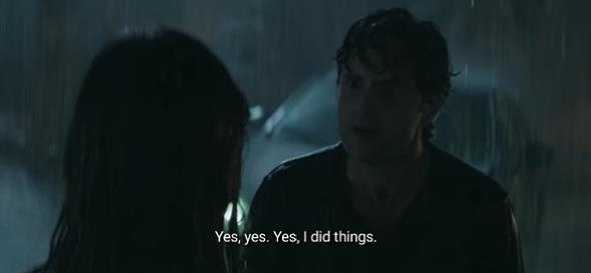
Picture 4 When Joe got angry with Love
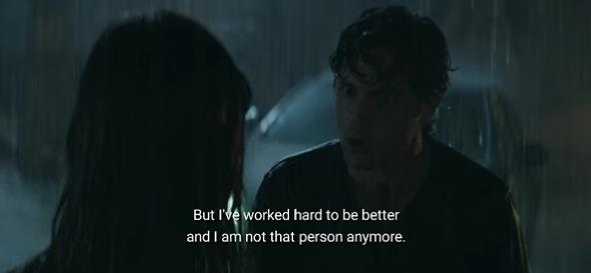
Picture 5 When Joe got angry with Love
While on the psychological structure of personality, Joe Goldberg his id, ego, and superego face problems in various ways, as follows:
Joe Goldberg's character in the television series You is defined as someone who enjoys stalking. He will seek out the lady he desires, break into their home, and seize their personal stuff to put in a box. However, it turned out that Joe's tendency persisted even after marriage. He deteriorated worse when he had an affair behind his wife's back. Joe's unconscious mind (Joe's Id) is still on the lookout for the ideal lady, the one he believes is meant for him.
Joe is unconcerned about his family status. Joe even had an affair with his neighbor, Natalie, whom Love murdered after knowing about the affair. Not only Natalie, but Joe also had an affair with Marienne behind Love. Joe is convinced that Marienne is the woman who was meant to be. Joe believes Ryan (Marienne's exhusband) is a stumbling block to their relationship while they are having a secret relationship, which triggers Joe's unconscious mind to murder him. In this instance, Superego Joe has been defeated by the strong will by Joe id to kill Ryan, and Ego, who serves as a mediator between Id and Superego, will lose and allow Id to achieve his goal.
Along with Ryan, who became a stumbling block to Joe and Marienne's relationship, there was also Love, which prevented Joe from being with Marienne. As a result, Joe plans to divorce Love and take Henry with him. However, Joe murdered Love by injecting aconite directly into his body and then manipulating her death into suicide.
Joe's obsession with women has a connection to his past. Joe is always drawn to women who have been abused psychically or verbally. Joe's perpetual attraction to abused women stems from his childhood, when he witnessed his mother being abused by his biological father. As a result, Joe feels a responsibility to protect the woman he likes and will do anything (even if it means killing innocent people) to be with her.
The ego serves as a link between the id and superego. Additionally, in Joe's situation, his ego is working when Love encourages Joe to murder Gil. On the one hand, Joe wants the Gil situation fixed immediately, yet he cannot just kill people after promising not to do it again. As a result, Ego Joe seeks a solution to the situation. As a result, Joe tries to create a strategy for Gil to escape the cage alive without having to disclose what Love has done to him to the authorities. Joe also has the notion to
discover Gil's vulnerability in order to use it as collateral so that when Joe and Love release Gil from the cage, he does not divulge Love's deeds. Here, Ego Joe attempts to strike a balance between satisfying Love and being impulsive by murdering people.
The superego is a conscious entity that is concerned with morality and the views of others, such as how to act or solve issues. Joe's Superego was continually reminding him of the promise he had made to himself: Joe would make his marriage with Love work and also pledge to be a decent father to Henry's son and refrain from killing innocent people. Additionally, he is aware that murdering or slandering individuals is insufficient care and is not acceptable.
Superego Joe will work by reminding himself whenever he feels the need to commit an awful act. The superego attempts to pacify the Id by assuring Joe's unconscious mind that he will never do anything wrong again since the present Joe is not the Joe who used to enjoy murdering people whenever he felt they were impeding his progress.
For instance, when Love encourages Joe to kill Gil, or when Joe is irritated by Cary, who screams at him and tells him to keep running despite the fact that Joe's frail physique cannot compete with Cary's robust physique, Joe's unconscious mind desires to murder Cary with the machete he is carrying. However, Joe's Superego asserts that he has evolved. He ceases to be a violent individual once he encounters someone who upsets him.
CONCLUSION
Psychoanalysis conflict on the character greatly affects a character in resolving the conflict he faces. For example, in the case of Joe Goldberg, Joe Goldberg himself experienced the most conflicts among a single man and conflicts between men. And when faced with a psychological conflict of personality, Joe Goldberg reacted differently depending on the model of the mind he had. The suggestions for further research might be to analyze the authors and the characters they write using psychoanalysis.
BIBLIOGRAPHY
Abrams, M. H., & Harpham, G. G. 2011. A glossary of literary terms (10th ed).
Wadsworth, Cengage Learning.
Freud, S. 2013. The Ego and The Id.
Hossain, Md. M. 2017. Psychoanalytic Theory used in English Literature: A Descriptive
Study. Global Journals Inc.
Kenney, W. 1966. How to Analyze Fiction. Monarch Press
Wright, E. 2003. Psychoanalytic criticism: Theory in practice (1. publ). Routledge.
AUTHOR PROFILE
Ni Luh Putu Widi Saraswati is a student majoring in English literature at the Faculty of Cultural Sciences, Udayana University.
Prof. Dr. Ketut Artawa, M.A. is a professor at the Faculty of Cultural Sciences majoring in English Literature. He joined the English Department of Udayana University in 1983. His educational background includes a bachelor's degree (BA) and a doctorandus (Drs.) degree in English language and literature from Udayana University, an MA degree in Linguistics, which graduated on the first day of June 1992. A Ph.D. degree in Linguistics graduated on the twenty-fourth day of March 1995 from La Trobe University.
Ni Made Ayu Widiastuti, S.S., M. Hum. is a lecturer at the English Department, Faculty of Arts, Udayana University. She has been teaching English since 2009. Her research interests are translations studies, English language teaching, phonology, and language documentation.
144
Discussion and feedback